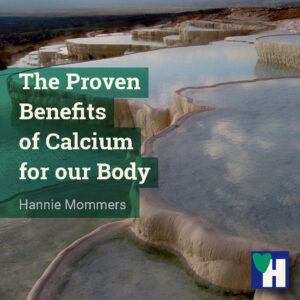
When my mother was 87 she broke her first hip, because she fell off her bike. Three years later she fell out of bed and broke the other one. Until her first hip fracture, my mother never used any medication or supplements.
I am not even sure her food was varied enough after my father passed away years earlier. Maybe she had a Calcium deficit, I don’t know.
It made me study the benefits of Calcium thoroughly because the healing process and the aftermath were difficult. And if I can prevent that happening to me, all the better. When you are aging, osteoporosis (bone loss or bone weakening) is a huge risk, especially for women.
Some of the links are affiliate links. As an affiliate associate, we earn a commission when you purchase any of the products offered through the shared links at no extra cost for you. This helps us maintain this website.
Table of contents
- 1 The benefits of Calcium
- 2 Why do we need Calcium?
- 3 How do we make sure our intake of Calcium is big enough?
- 4 What is the required daily amount of Calcium?
- 5 What are the effects of Calcium deficiency?
- 6 Nothing stands on itself – what more can we do?
- 7 Exercise promotes the absorption of Calcium
- 8 Don’t be too stubborn to take necessary measurements!
- 9 What are the risks of too much calcium?
- 10 In conclusion
The benefits of Calcium
Calcium is an essential mineral required for the development and maintenance of healthy bones and teeth. Among other things, it is essential to a healthy nervous system and prevents osteoporosis when we age.
Why do we need Calcium?
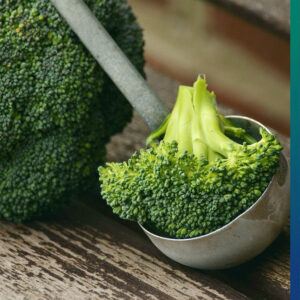
Calcium is a mineral highly needed for building and maintaining bones and teeth. Calcium helps against osteoporosis when we are aging. It is necessary for the proper functioning of the nerves and muscles. It helps blood to clot; in the absence of Calcium, no blood clotting is possible. And it is necessary for the transport of other minerals in the body, such as sodium, potassium, and magnesium.
Other benefits of Calcium are that it reduces the risk for certain cancers, especially colon cancer and breast cancer. A higher Calcium intake can lower the “bad” cholesterol (LDL). This can also be beneficial for blood pressure and a healthy heart.
How do we make sure our intake of Calcium is big enough?
Our first priority is the variety of the food we eat. Food containing Calcium:
- Milk and milk products like yoghurt
- Cheese
- Eggs
- Broccoli
- Kale
- Beans, white and brown
- Chickpeas
- Nuts, like almonds, hazelnuts and Brazil nuts
Dairy is the greatest source of Calcium. Does this mean I am at a loss because I don’t eat or drink dairy? Not necessarily, but it is obvious I have to be extra careful then. That’s why I eat a lot of nuts and why I take a Calcium supplement.
Vitamin D stimulates the absorption of Calcium in the body. But I also have a Vitamin D deficiency, hence I take a Vitamin D supplement as well. That’s why I take extra care of what I eat and do.
Smoking and alcohol prevent the absorption of Calcium.
What is the required daily amount of Calcium?
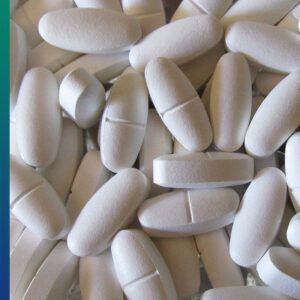
For adults, the recommended daily amount is 1.000 mg. And it has to be more when aging.
When you are between 50 and 70 years old the recommended dose is 1.100 mg and when you are over 70 even 1.200 mg. (Source: Dutch Nutrition Center)
It’s not immediately bad if your intake is occasionally more than 2.500 mg, but it is seen as the maximum dose.
The risk for taking more than the maximum quantity is calcification of the kidneys and blood vessel walls, or kidney stones.
High doses disrupt the absorption of minerals like iron, zinc, magnesium, and phosphorus.
With a varied diet and normal supplement intake, you don’t have to worry you’re overdosing yourself. For that, you would have to drink at least 2 to 3 liters of milk each day!
What are the effects of Calcium deficiency?
I have already mentioned osteoporosis as the main risk for elderly women. For young children, Calcium deficiency can cause rickets. And for both the elderly and the young, a serious deficiency can cause muscle cramps.
When a lack of vitamin D prevents Calcium from sufficiently being absorbed, there is a risk of osteomalacia (bone softening).
As with any serious problem, when you are in doubt it is crucial you visit a doctor.
Related: Unexpected Vitamin D Deficiency despite a lot of Sun?
Nothing stands on itself – what more can we do?
This article is about supplements. This doesn’t mean however that I recommend concentrating your intake of the necessary vitamins and minerals on supplements alone. Everything on this earth functions better when it is in balance.
For the human body, this means you take the best care of yourself when your body and mind are in harmony with each other. That you balance rest and movement.
When you are aging it is required to exercise enough. Young people run around most of the time. Busy jobs and demanding family tasks usually make sure they move enough during the day. Some seniors consider growing older as the designated time to slow down and sit a lot. It is the worst decision you can make in my opinion.
Exercise promotes the absorption of Calcium
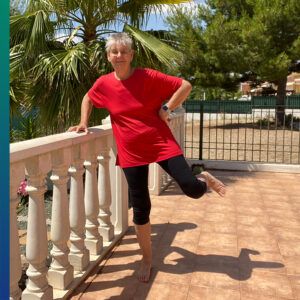
In aging bodies, a lot of processes slow down. This also applies to the absorption of Calcium. Moving around stimulates this absorption.
You don’t have to exhaust yourself at the gym. (Although there is nothing against that either!) A simple daily half-hour walk in the open air is sufficient.
When you – like me – want to take extra care of your bones and hips, do exercises that train specific parts of your body.
I do general strength training several times a week. One of the exercises is the Hip Helper, which helps to develop my sense of balance and strengthens the muscles. I must admit I hate that exercise, yet I do it anyway.
Don’t rush exercises like this, it’s not a speed game. Executing them mindfully is way better for the desired result.
Don’t be too stubborn to take necessary measurements!
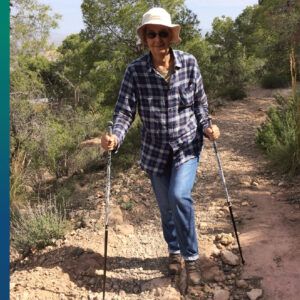
Like a lot of people, I don’t mind that I am aging, but I do mind being treated as a mumbling old woman. And sometimes I’m hypersensitive to even a hint of age discrimination.
If eventually, this would mean that I refuse to do certain things because that would mark me as ‘being old’ I am acting against my own well-being.
A friend of my mother refused to use a walking stick for that reason. She always walked with a bicycle next to her, suggesting she just had a ride and was now walking the bicycle to its shed.
And when she fell into the wrong direction one day, sprawling across the bike, she had to be rushed to the hospital.
That’s why I vary my food, take my Calcium supplements, and do my exercises to prevent falls devotedly. 🙂
What are the risks of too much calcium?
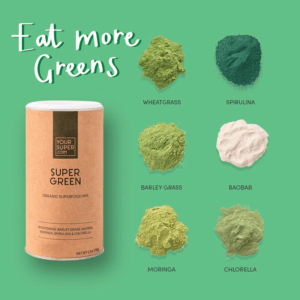
If we concentrate too much on calcium alone we are at risk of taking too much. How would we know?
First of all, don’t take supplements just because someone else (like me, 😉 ) says you should. Educate yourself and base your decisions on your condition. Talk to your GP or an orthomolecular expert.
An excess of calcium is called hypercalcemia and manifests itself, among other things, by constipation, nausea, having to urinate a lot, or listlessness.
The cause of hypercalcemia can be an excess of vitamin A or vitamin D. Calcium can counteract the absorption of magnesium, which is why some calcium supplements also contain magnesium.
Too much calcium can cause kidney stones, so make sure you drink enough water.
Related: Amazing Health Benefits of Magnesium and Magnesium Supplements
In conclusion
We need calcium for the optimal functioning of our bodies. For the most part, we can absorb enough calcium from food, and sometimes we have a deficiency that makes taking a supplement worthwhile.
What Calcium-rich food do you like most? Tell me in the comment box.

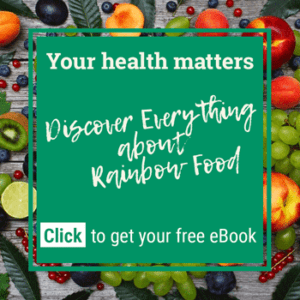

Great article. Very interesting and informative. My grandmother had broken a hip in her 70’s and while recovering from surgery developed pneumonia while in ICU and passed away. That was 20 years ago. At 50+ we live a very active lifestyle and are enjoying many fun adventures with our grandchildren. Should we consult with our doctor before beginning to supplement with calcium? How do we know if our diet is providing enough calcium?
Thanks, Deb.
So many elderly die in the end because of pneumonia on top of an other health problem. So sad. Really sorry to hear about your grandmother.
If you do regular bloodtests you could ask them to look at your calcium level as well. And when you are in doubt you certainly should go to the doctor. But if your overall health is good there is no problem taking a calcium supplement. You have to take in an awful lot to overdose yourself.
If you want to calculate how much calcium is in your diet, I would suggest keeping a list of all you eat and drink during one or two weeks and than calculate. There are a lot of tables on the internet that give an estimate of the quantities of Calcium. Just Google on “How much Calcium is in …”. Good luck. 🙂
Excellent article on calcium. My husband is a coeliac and one of the problems with that disease is osteoporosis, when he was first diagnosed he had to have a bone density scan and he was put on calcium tablets for 5 years.
Until then I like many others had never really given it much thought before. Now I know the importance of it I get it checked often when I have bloods done.
Thanks Lisa. And you are right, checking is knowing 🙂
That is a super great article.
Before I will be getting old (I am 30 years old now.), With the aging society, I have to consider what daily food I have. One of them to be concerned is “Calcium”. Nowadays, working out is very important too. Normally, I take a weekly heavy fitness course to gain my muscles. 🙂
All the best and thank you so much to make me realize this article
Kumponchai
Thanks Kumponchai. Yes, even when you are not old yet it is good to take care of your body. 🙂
Thanks for sharing this great content! It let me know more and understand calcium is so much important to our body. Luckily, some of the food containing calcium are my favourite.
Keep it up for more great content!
Thanks, Samuel. And it is always great to know, that your favorite food is also good for you, isn’t it. 🙂
Hello. Great article, very informative. With calcium it is very important to have adequate amount of Vit D. Vitamin D allows the body to absorb the calcium we need. For those living in countries with not much sun, Vit D deficiency is quite common. Additional supplementation of Vit D is just as important.
Thank you for a great read. All the best
That is so true, Felicity. 🙂
Thanks.
Hello Hannie,
I think since I was born I’ve been hearing things like: “drink milk, eat cheese… to have strong bones”. And I do. I also love almonds, nuts, yoghurt. I understand how calcium is important and I’m grateful to you for this article, it’s very informative and interesting 🙂
Mums know best, don’t they, Tanya. Although we not always like that. 🙂
I eat yogurt most mornings for breakfast so I know I am probably getting enough in my diet. However, I never knew that exercising can help absorb calcium. This is definitely motivating me to get outside and walk every day.
Exercising is beneficial for a lot of things, so we’d better move a lot 🙂
And being outside is great. Especially when you live in a beautiful area, like you do, I think?
Thanks for this great article
As a physician, I treat a lot of patients who do not focus on calcium in their diet. The results are not goods; they may suffer from osteoporosis and fractures.
I think your articles important for general health and wellness
Thanks Faresd. It’s good to hear from a true professional that my articles make sense 😀
Your article is informative that will benefit a lot of people.
Due to people being busy these days, a lot of access to fast and instant food, taking Calcium supplements is I think necessary.
To have healthy bones will benefit you as you get aged.
I had a Calcification 3 times in 2 years. My doctor said, it is because of excess calcium on my blood– after that, I kind of strict my self on taking milk, but I still make sure I’m getting enough Calcium on different sources.
It’s always hard to find the right balance, isn’t it, Mina. But important that we do. Take care!